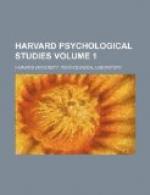The antithesis is also misinterpreted, or at least wrongly narrowed, if it is called voluntarism versus associationism. Recent discussions have sufficiently shown that the principle of association is not the only possible one for phenomenalistic theories. If associationism is identified with objective psychology, all the well-founded objections to the monopoly of the somewhat sterile principle of association appear as objections to phenomenalism in psychology, and voluntaristic theories, especially those which work with the teleological category of apperception, are put in its place. But without returning to apperceptionism we can overcome the one-sidedness of associationism if full use is made of the means which the world of phenomena offers to theory. The insufficiency of associationism disappears if the content of consciousness is considered as variable not only as to quality and intensity but also as to vividness. This variation of vividness, on the other hand, is no exception from the psychophysical parallelism as soon as the psychical process is considered as dependent not only upon the local and quantitative differences of the sensory process but also upon the motor function of the central physical process. The one-sidedness of the physiological sensory theories has been the hidden reason for the one-sidedness of associationism. The sensory-motor system must be understood as the physical basis of the psychophysical process and the variations in the motor discharge then become conditions of those psychical variations of vividness which explain objectively all those phenomena in whose interest associationism is usually supplemented by apperceptionism. The association theory must thus be given up in favor of an ’action-theory’[1] which combines the consistency of phenomenalistic explanation with a full acknowledgment of the so-called apperceptive processes; it avoids thus the deficiency of associationism and the logical inconsistency of apperceptionism.
[1] H. Muensterberg, ‘Grundzuege
der Psychologie.’ Bd. I.,
Leipzig, 1900, S. 402-562.
Only if in this way the sciences of voluntaristic type, including all historical and normative sciences, are fully separated from phenomenalistic psychology, will there appear on the psychological side room for a scientific treatment of the phenomena of social life, that is, for sociology, social psychology, folk-psychology, psychical anthropology and many similar sciences. All of them have been in the usual system either crowded out by the fact that history and the other mental sciences have taken all the room or have been simply identified with the mental sciences themselves. And yet all those sciences exist, and a real system of sciences must do justice to all of them. A modern classification has perhaps no longer the right as in Bacon’s time to improve the system by inventing new sciences which have as yet no existence, but it has certainly the duty not to ignore important




